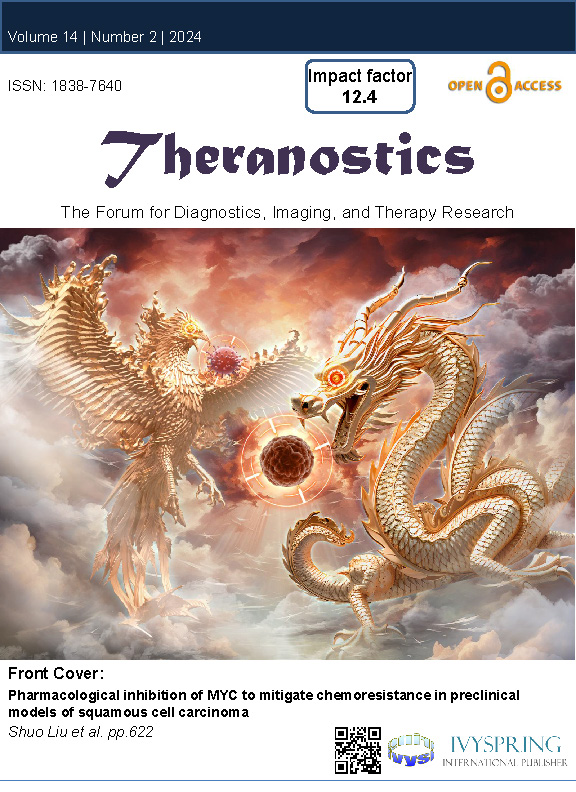Honokiol通过破坏SNX3-retromer复合物提高西妥昔单抗对KRASG13D突变型结直肠癌的敏感性
IF 12.4
1区 医学
Q1 MEDICINE, RESEARCH & EXPERIMENTAL
引用次数: 0
摘要
理由:原癌基因 KRAS 在结直肠癌 (CRC) 中经常发生突变,导致对针对表皮生长因子受体 (EGFR) 的单克隆抗体(如西妥昔单抗)产生固有抗药性。因此,解决原发性耐药性和扩大靶向治疗的适应症已成为严峻的挑战。/n方法:针对 KRAS 突变的 CRC 细胞对天然产物库进行了筛选,最终发现了一种对 KRASG13D 突变位点敏感的小分子化合物。利用 KRASG13D 突变型 CRC 模型对这种小分子化合物与西妥昔单抗联用的抗肿瘤活性进行了体内和体外评估。该评估包括检查其对细胞增殖、活力、凋亡、细胞周期进展和肿瘤生长的影响。此外,我们还采用了 RNA 测序、Western 印迹分析、免疫荧光、实时定量 PCR 和牵拉试验等方法来探讨这种小分子化合物与西妥昔单抗联合使用产生协同抗肿瘤效应的分子机制。此外,我们还发现,西妥昔单抗与 honokiol 联用可协同增强西妥昔单抗在 KRASG13D 突变型 CRC 体内和体外模型中的敏感性。从机理上讲,honokiol可抑制SNX3-retromer介导的转运,从而阻碍溶酶体蛋白水解能力,抑制自噬和大吞噬通量。此外,honokiol 还能抑制 RAS GDP 向 RAS GTP 的转化,从而提高 KRASG13D 突变型 CRC 细胞对西妥昔单抗的敏感性。这些发现为扩大 KRAS 突变型结直肠癌患者的靶向治疗适应症提供了一种前景广阔的策略。本文章由计算机程序翻译,如有差异,请以英文原文为准。
Honokiol enhances the sensitivity of cetuximab in KRASG13D mutant colorectal cancer through destroying SNX3-retromer complex
Rationale: the proto-oncogene KRAS is frequently mutated in colorectal cancer (CRC), leading to inherent resistance against monoclonal antibodies targeting the epidermal growth factor receptor (EGFR), such as cetuximab. Therefore, addressing the primary resistance and expanding the indications for target therapy have become critical challenges./nMethods: the screening of a natural product library against KRAS mutant CRC cells was conducted, leading to the discovery of a small molecule compound that sensitive to the KRASG13D mutation site. The anti-tumor activity of this small molecule compound in combination with cetuximab was evaluated using the KRASG13D mutant CRC models both in vivo and in vitro. This evaluation includes an examination of its effects on cell proliferation, viability, apoptosis, cell cycle progression, and tumor growth. Furthermore, RNA sequencing, western blot analysis, immunofluorescence, real-time quantitative PCR, and pull-down assays were employed to explore the molecular mechanisms underlying the synergistic anti-tumor effect of this small molecule compound in combination with cetuximab./nResults: our study screened 882 compounds in KRAS mutant CRC cells and identified honokiol, a small molecule compound that exhibits specific sensitivity to KRASG13D mutant CRC cells. Furthermore, we revealed that the synergistic augmentation of cetuximab's sensitivity in vivo and in vitro models of KRASG13D mutant CRC in combination with honokiol. Mechanistically, honokiol suppresses SNX3-retromer mediated trafficking, thereby impeding lysosomal proteolytic capacity and inhibiting autophagy and macropinocytosis fluxes. Moreover, honokiol inhibits the conversion of RAS GDP to RAS GTP, heightening the susceptibility of KRASG13D CRC mutant cells to cetuximab./nConclusions: honokiol enhances the sensitivity of cetuximab by destroying SNX3 retromer in KRASG13D mutant CRC preclinical model. These findings present a promising strategy for expanding the indications of target therapy in KRAS mutant colorectal cancer patients.
求助全文
通过发布文献求助,成功后即可免费获取论文全文。
去求助
来源期刊

Theranostics
MEDICINE, RESEARCH & EXPERIMENTAL-
CiteScore
25.40
自引率
1.60%
发文量
433
审稿时长
1 months
期刊介绍:
Theranostics serves as a pivotal platform for the exchange of clinical and scientific insights within the diagnostic and therapeutic molecular and nanomedicine community, along with allied professions engaged in integrating molecular imaging and therapy. As a multidisciplinary journal, Theranostics showcases innovative research articles spanning fields such as in vitro diagnostics and prognostics, in vivo molecular imaging, molecular therapeutics, image-guided therapy, biosensor technology, nanobiosensors, bioelectronics, system biology, translational medicine, point-of-care applications, and personalized medicine. Encouraging a broad spectrum of biomedical research with potential theranostic applications, the journal rigorously peer-reviews primary research, alongside publishing reviews, news, and commentary that aim to bridge the gap between the laboratory, clinic, and biotechnology industries.
 求助内容:
求助内容: 应助结果提醒方式:
应助结果提醒方式:


